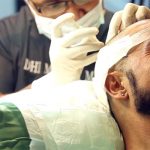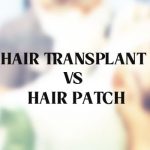Post Hair Transplant Diet Essentials – Nourishing Your New Hair Growth
Hair loss has emerged as a notable concern among both men and women. In the past, hair loss was primarily attributed to aging and genetics. However, things have changed today. Many individuals, particularly males, face the issue of male pattern baldness at a relatively young age, typically between 27 and 33 years old. Thankfully, we are in the age of advancement, so there is no shortage of hair transplant techniques.
Hair transplantation has become increasingly popular these days. There are many hair transplant techniques available out there, including Direct Hair Implantation (DHITM), Follicle Unit Extraction (FUE), Follicle Unit Transplantation (FUT), and so on. DHITM is considered the best because the DHITM Total Care System leads it. DHITM Total Care System is launched, bringing together extensive research, advanced diagnosis, superior treatment, and the promise of lifetime support to our clients.
Direct hair implantation offers long-lasting and authentic hair restoration outcomes with maximum density and natural-looking results for a lifetime. The best thing about DHI technique is that it is safe, painless, has no downtime, and allows for a speedy recovery. Moreover, direct hair implantation offers the highest graft survival rate, a significant plus, and the end-to-end procedure is performed by a surgeon only.
The success of hair transplant treatment depends on several factors, including post-operative care. Of course, we always emphasize selecting a reputable hair transplant clinic with highly qualified surgeons. This is because highly skilled surgeons at reputable clinics know their jobs well. They leave no stone unturned to help you with fuller and natural-looking hair growth.
However, if you fail to care for your scalp after the procedure, you may experience unsatisfactory results. Therefore, it is crucial to adhere to the post-operative instructions provided by your surgeon. In addition, you will need to consume a healthy and balanced diet to nourish your hair.
Are you wondering what kind of diet?
Read on!
Here, we will discuss some essential food items you must include in your diet for excellent hair transplant outcomes.
Let’s begin…
We want to shed light on the importance of post-operative care before we move to the post-hair transplant diet essentials. Here we go…
Why is Post-operative Care Essential After Hair Transplant?
The hair transplant procedure is not complete after the surgery alone. There are additional factors to consider following the surgery. Yes, you got it right! It’s your post-op aftercare that you need to adhere to religiously to achieve the highest hair transplant outcomes. After the procedure, your surgeon will provide you with essential aftercare guidelines.
These guidelines usually include taking adequate rest and proper nutrition. Following your doctor’s advice will help you heal faster and stay safer. Hair loss is frequently caused by a diet that lacks essential nutrients. After a hair transplant surgery, it becomes crucial to consume a balanced diet to accelerate hair growth. Following your surgeon’s instructions religiously is necessary to achieve favorable outcomes.
Let’s now take a look at the post-hair transplant diet essentials to nourish your new growth…
Post-Hair Transplant Diet Essentials
Protein
When it comes to having healthy and bouncy hair, protein plays a crucial role. Protein is an essential macronutrient that plays a vital role in hair growth. Consuming enough protein in your diet is necessary for promoting strong and healthy hair. Insufficient or deficient protein intake in your diet can lead to dry, brittle, and weak hair. Lack of protein in your diet can even contribute to significant hair loss.
Proteins play a crucial role in the development and maintenance of your hair and scalp tissues. Consuming a diet rich in protein can aid in the acceleration of post-surgery healing and promote enhanced hair growth for transplanted follicles. Protein-rich foods include pulses, nuts, dairy products, walnuts, eggs, fish, and chicken.
Zinc
Zinc is yet another essential nutrient that you require for hair growth. It enhances collagen production in the body, which aids in the regeneration of cells and the repair of tissues following surgery. In addition, Zinc also helps maintain hormone levels and facilitates the absorption of essential vitamins and minerals. Zinc-rich food includes seafood, nuts, whole grains, cashews, etc.
Iron
Iron is, again, an essential nutrient that you need for hair growth. Iron enhances the oxygen flow in your bloodstream and boosts your body’s immune system. Increased blood flow helps to ensure that vitamins and nutrients are effectively delivered to your hair roots. Consuming iron-rich foods promotes hair growth and enhances the texture of your scalp hair. Iron-rich foods are leafy vegetables, seafood, red meat, etc.
Vitamin A
When it comes to essential nutrients for new growth, Vitamins play a crucial role. Vitamin A is vital in promoting cell growth and stimulating sebum production by your hair follicles. More often than not, patients experience dry scalp issues after undergoing hair transplant treatment. Consumption of Vitamin A can help preserve the natural oils on your scalp and prevent itchiness on your newly treated scalp. Vegetables like kale, carrots, spinach, sweet potato, and pumpkin are rich in Vitamin A. Consuming them regularly can help nourish your new growth significantly.
Vitamin B- Complex
Vitamin B plays a crucial role in maintaining overall health and well-being. B-Complex vitamins include B12 and Biotin (B7). These Vitamins are essential for promoting hair growth and maintaining strong hair structure. A hair transplant is a surgical procedure. It would be best if you gave yourself time so that your newly treated scalp can heal. Consuming food rich in Vitamin B-Complex promotes healing, which is crucial following hair transplant surgery. Foods that contain B-complex vitamins include eggs, nuts, bananas, avocados, chicken, etc.
Vitamin D
Vitamin D is yet again an essential nutrient for hair growth. According to research, a deficiency of Vitamin D in the body can lead to male pattern baldness. Consuming a Vitamin D-rich diet can aid in activating hair growth cells. Vitamin D-rich foods include fish, walnuts, chia seeds, flaxseeds, red meat, fish oil, salmon, eggs, etc.
Wrapping up…
So, there you have it: the post-hair transplant diet essentials that you must include in your meals post-hair transplant. Adhering to a proper diet can help you have the best outcomes. In addition, your surgeon will provide other aftercare instructions, such as avoiding long baths, water sports, direct sun, and so on. Make sure to follow the aftercare instructions provided by your surgeon. Doing so will ensure overall well-being and proper nourishment of your new growth.
How Can DHI India Help in your hair growth journey?
DHI India is a highly regarded hair transplant chain of clinics in various locations in India and abroad. We have gained a reputation for offering the highest-quality hair transplant services globally. We are proud to be the pioneers of the Direct Hair Implantation DHITM Total Care System. We have a team of highly skilled surgeons who carefully extract hair from a donor site and then implant it in the areas of the scalp that are experiencing thinning or balding. With us, you can be sure of the best hair transplant results/outcomes. Moreover, our surgeons will help you with the right diet plan and medications that will help promote new growth post-surgery.







